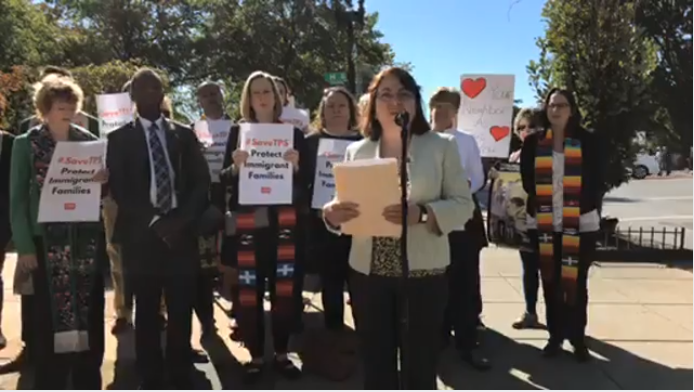Seventeen years ago, Corina Lopez came to the United States to pursue two of her biggest dreams: building a small home for herself and her family in El Salvador and learning to speak English.
Lopez, a member of Calvary Baptist Church in Washington, D.C., thought if she worked hard and managed her money well, she could save enough to return to El Salvador in just three years.
“That was my plan, but not God’s will,” Lopez said Oct. 17 at a rally outside the White House calling on President Trump to preserve a government program that gives legal-immigrant status to people from designated countries experiencing natural disaster, armed conflict or other extraordinary conditions that hinder them from returning to their homes.
After a major earthquake measuring 7.6 on the Richter scale hit El Salvador in January 2001, President George W. Bush granted Salvadoran citizens living in the U.S. Temporary Protected Status, enabling them to remain in the country temporarily to continue to work and send money home without fear of deportation.
“My country of origin was devastated, by the earthquake and economically,” Lopez recalled. “It could have been more devastating for El Salvador to receive an influx of people whose work visas were expired.”
Though it seemed like a good opportunity, Lopez hesitated for months, because she didn’t know when she would be able to return to her home country. With encouragement from her parents, she finally decided to take advantage of Temporary Protected Status, a program managed by the Department of Homeland Security.

“Temporary Protected Status was my salvation to stay in this country legally,” Corinna Lopez said at the rally co-sponsored by Calvary Baptist Church and Faith in Public Life.
“Temporary Protected Status was my salvation to stay in this country legally,” Lopez said at the rally co-sponsored by Calvary Baptist Church and Faith in Public Life.
El Salvador is one of 10 countries that currently qualify for TPS status due to conditions that prevent their nationals from returning safely or where the country is unable to adequately handle their repatriation. The other nine are Haiti, Honduras, Nepal, Nicaragua, Somalia, Sudan, South Sudan, Syria and Yemen.
With President Trump’s recent decision to end the Deferred Action for Childhood Arrivals program (DACA) and repeated attempts by the White House to ban travelers from Muslim-majority countries, hundreds of thousands of individuals from TPS countries now wonder if they will be the next class of immigrants affected by the current administration’s agenda to tighten control of America’s borders.
Guinea, Liberia and Sierra Leone recently rotated off the list, after Secretary of Homeland Security Jeh Johnson determined the three countries have recovered sufficiently from the 2014-2016 Ebola epidemic to safely repatriate their citizens.
Former Homeland Security Secretary John Kelly, now White House chief of staff, granted Haiti a six-month extension in May, rather than the usual 18 months, and advised Haitian President Jovenel Moïse to prepare to absorb Haitians living in the U.S. under Temporary Protected Status since the devastating Haiti earthquake of 2010.
Homeland Security officials recently decided not to renew TPS designation for Sudan, allowing it to expire Nov. 2 and giving Sudanese nationals another 12 months to acquire another legal status or get out of the country.
TPS designations for Honduras and El Salvador expire early next year, and immigration officials say they are reviewing conditions to determine whether to grant a renewal.
Lopez’ pastor, Maria Swearingen, said she wants the president to save TPS not only for economic reasons but also because what ending the program would mean for Calvary Baptist Church, which worships both in English and Spanish.
“At the church I pastor, this is personal,” Swearingen said. “I am talking about members of my congregation, families I have prayed with, cried with, laughed with, struggled with and lived with. I’m talking about what it would mean for our church to suddenly lose faithful members to the whims of people in power who either refuse to or cannot see how a decision like these affects real human lives.”
“In my church, we believe that you can test the moral conscience of a nation by how well that nation treats the stranger and the immigrant,” Swearingen said. “In my church, we understand that when people in positions of power make decisions void of compassion or conscience, it’s time to speak out and to speak clearly.”
Lopez said she continues to work hard to save money not only for her dream home, but also for the several hundred dollars she must pay every 18 months to renew her TPS status.
“Nothing has been free for me,” she said. “I have been working hard for myself and my family. I pay my taxes just like every American does. Now I am a homeowner with a good job, speaking the language and praying for immigration reform.”
“Sixteen years have passed, and now I see myself and thousands more people living in the unexpected, like in a bad dream, not knowing what will happen to us, to our dreams and our families,” Lopez said. “Today, I’m here to beg this administration to be just and humane. I want to implore President Trump to approve the extension for the Temporary Protected Status, not only for Salvadorans but for the 10 countries. Mr. President, you can do it. Please do it.”

